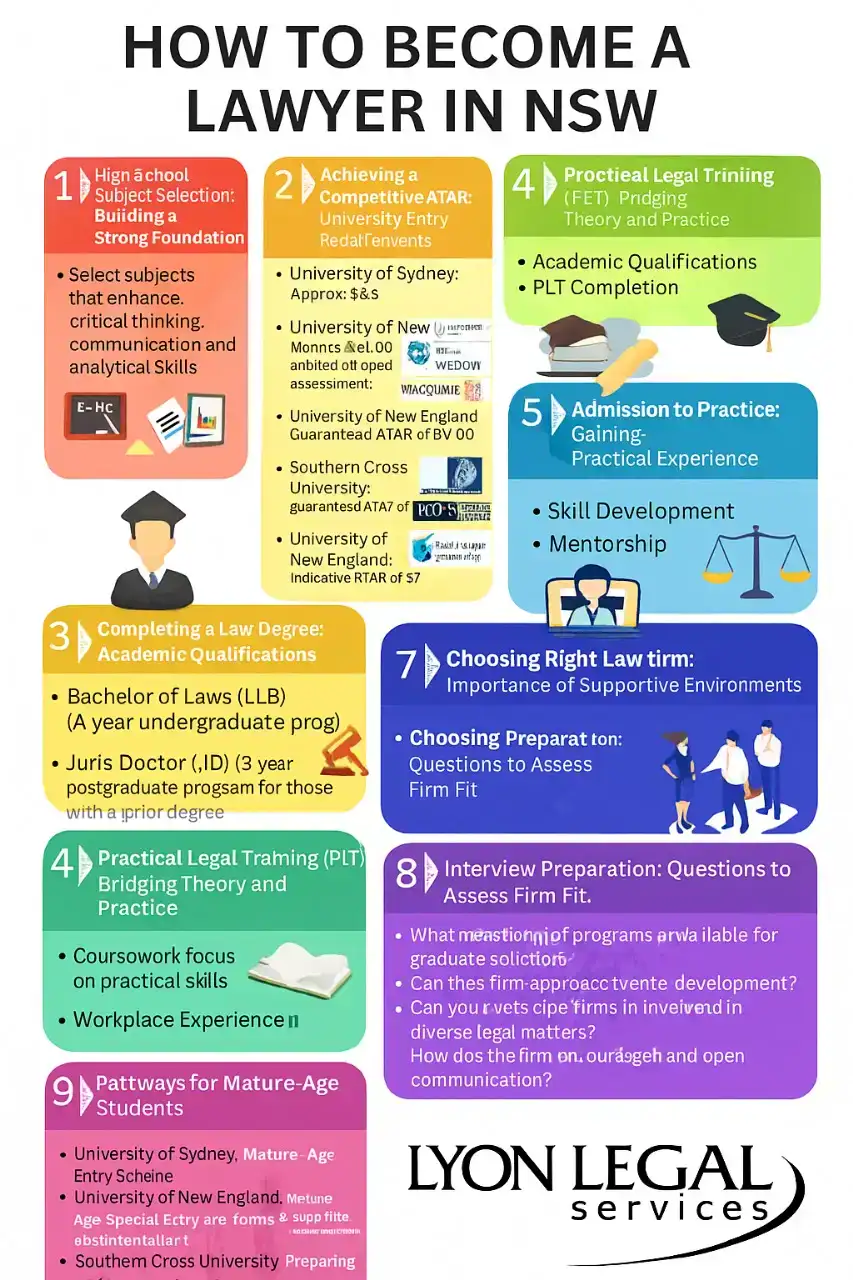Embarking on a legal career in New South Wales (NSW) is a journey that requires dedication, strategic planning, and a commitment to continuous learning. This guide outlines the steps to becoming a lawyer in NSW, from high school subject selection to securing a position in a supportive law firm like Lyon Legal Services.
1. High School Subject Selection: Building a Strong Foundatio
While there are no mandatory subjects for law school admission, selecting subjects that enhance critical thinking, communication, and analytical skills is advantageous. Consider the following:
English Advanced: Develops reading comprehension and writing proficiency.
Legal Studies: Offers an introduction to the legal system and its principles.
Modern History: Enhances understanding of societal developments and analytical skills.
Business Studies: Provides insights into commercial operations and economic principles.
Mathematics: Strengthens logical reasoning and problem-solving abilities.
Choosing subjects that align with your strengths and interests can lead to better academic performance, positively impacting your Australian Tertiary Admission Rank (ATAR).
2. Achieving a Competitive ATAR: University Entry Requirements
Admission to Bachelor of Laws (LL programs in NSW is competitive. The required ATAR varies by institution:
University of Sydney: Approximately 99.5 for combined Law courses.
University of New South Wales (UNSW): Around 92.0, with the Law Admission Test (LAT) also considered.
University of Technology Sydney (UTS): Approximately 96.05.
Macquarie University: Around 96.0.
University of New England (UNE): Guaranteed ATAR of 80.00 for the 4-year LLB program.
Southern Cross University (SCU): ATAR requirements vary; applicants are encouraged to check the specific course details.
University of Newcastle: ATAR requirements vary depending on the specific combined degree; applicants should consult the university’s admissions information.
Australian National University (ANU): Indicative ATAR of 97 for the Bachelor of Laws (Honours)/Bachelor of Arts program.
Note that some universities, like UNSW, require additional assessments such as the LAT, which evaluates skills relevant to legal studies.
3. Completing a Law Degree: Academic Qualifications
Pursue an accredited law degree, such as:
Bachelor of Laws (LL: Typically a 4-year undergraduate program.
Juris Doctor (JD): A 3-year postgraduate program for those with a prior degree.
Ensure your program covers the “Priestley 11” core subjects mandated for legal practice in Australia:
Administrative Law
Civil Procedure
Company Law
Contracts
Criminal Law and Procedure
Equity (including Trusts)
Ethics and Professional Responsibility
Evidence
Constitutional Law
Property
Torts
4. Practical Legal Training (PLT): Bridging Theory and Practice
After your law degree, complete a PLT program, which includes:
Coursework: Focused on practical skills like client interaction and legal writing.
Workplace Experience: Typically 20 days under supervision in a legal setting.
PLT can be undertaken through institutions like the College of Law or integrated into some university programs.
5. Admission to Practice: Becoming a Legal Practitioner
Upon completing PLT, apply for admission to the Supreme Court of NSW. Requirements include:
Academic Qualifications: Completion of an accredited law degree.
PLT Completion: Evidence of practical training.
Good Character: Declarations and references attesting to your suitability.
After admission, you can apply for a practising certificate from the Law Society of NSW to work as a solicitor.
6. Supervised Practice: Gaining Practical Experience
Newly admitted solicitors typically work under supervision for two years, holding a Restricted Practising Certificate. This period allows for:
Skill Development: Applying legal knowledge in real-world scenarios.
Mentorship: Learning from experienced practitioners.
Professional Growth: Building confidence and competence.
7. Choosing the Right Law Firm: Importance of Supportive Environments
Selecting a law firm that fosters growth is crucial. Firms like Lyon Legal Services are known for:
Structured Mentorship: Providing guidance from seasoned lawyers.
Professional Development: Offering training and learning opportunities.
Supportive Culture: Encouraging collaboration and continuous improvement.
Such environments are instrumental in shaping competent and confident legal professionals.
8. Interview Preparation: Questions to Assess Firm Fit
When interviewing with potential employers, consider asking:
What mentorship programs are available for graduate solicitors?
How does the firm support ongoing professional development?
Can you describe the firm’s approach to work-life balance?
What opportunities exist for involvement in diverse legal matters?
How does the firm encourage feedback and open communication?
These questions can help determine if the firm’s values and practices align with your career goals.
9. Pathways for Mature-Age Students
For individuals aged 21 and over who may not meet traditional entry requirements, several universities offer alternative pathways:
University of Sydney: Offers a Mature-Age Entry Scheme for domestic students aged 21 or older who have completed an eligible preparation course within the previous two years and do not possess certain qualifications such as an ATAR of 70 or above or prior tertiary study.
University of New England (UNE): Provides a Mature Age Special Entry pathway, requiring applicants to complete a pro forma detailing their educational background and supporting documentation to demonstrate their capacity for academic success.
Southern Cross University (SCU): Offers the “Preparing for Success at SCU” program, an alternative entry scheme designed to bridge the gap for individuals without formal qualifications or marks to apply for university entry.
Australian National University (ANU): Features a Work and Life Experience Based Entry Scheme for applicants over 21 who do not hold assessable qualifications. Admission is based on performance in the Skills for Tertiary Admissions Test (STAT), which includes both multiple-choice and written English components.
These pathways provide mature-age students with opportunities to pursue legal studies by recognizing diverse educational and life experiences.
Conclusion
Becoming a lawyer in NSW is a multifaceted process that extends beyond academic achievement. It involves strategic subject selection, meeting competitive entry requirements, completing rigorous training, and choosing a supportive work environment. By aligning yourself with firms like Lyon Legal Services, which prioritise growth and development, you can establish a fulfilling and successful legal career.
Author : Jason


















